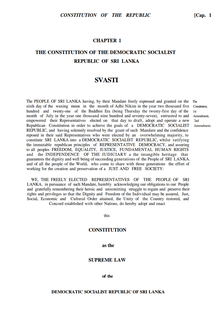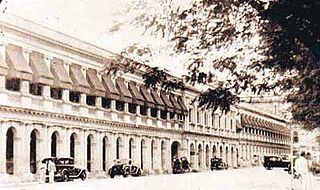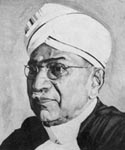
The Parliament of the Democratic Socialist Republic of Sri Lanka is the supreme legislative body of Sri Lanka. It alone possesses legislative supremacy and thereby ultimate power over all other political bodies in the island. It is modeled after the British Parliament.

The Ceylon Workers' Congress (CWC) is a political party in Sri Lanka that has traditionally represented Sri Lankan Tamils of Indian origin working in the plantation sector of the economy.

The State Council of Ceylon was the unicameral legislature for Ceylon, established in 1931 by the Donoughmore Constitution. The State Council gave universal adult franchise to the people of the colony for the first time. It replaced the Legislative Council of Ceylon, the colony's original legislative body.
The Jaffna Youth Congress, was the first of Sri Lanka's Youth Leagues. It was influenced by the Indian Independence Movement, was secular and committed to Poorana Swaraj, national unity and the eradication of inequalities imposed by caste.
The Donoughmore Commission (DC) was responsible for the creation of the Donoughmore Constitution in effect between 1931–47 in Ceylon. In 1931 there were approximately 12% Ceylonese Tamils, 12% Indian Tamils, 65% Sinhalese, and ~3% Ceylon Moors. The British government had introduced a form of communal representation which a strong Tamil representation, out of proportion to the population of the Tamil community. The Sinhalese had been divided into up-country and low-country Sinhalese.

Ganapathipillai Gangaser Ponnambalam was a Ceylon Tamil lawyer, politician and cabinet minister. He was the founder and leader of the All Ceylon Tamil Congress (ACTC), the first political party to represent the Ceylon Tamils.

The Constitution of the Democratic Socialist Republic of Sri Lanka has been the constitution of the island nation of Sri Lanka since its original promulgation by the National State Assembly on 7 September 1978. As of May 2015 it has been formally amended 19 times.
Veerasingham Anandasangaree is a leading Sri Lankan Tamil politician, former Member of Parliament and leader of the Tamil United Liberation Front. He is commonly known as Sangaree. A vocal critic of violence committed by all sides, Sangaree is a supporter of federalism similar to that of India as a solution to Sri Lanka's ethnic conflict.

The Speaker of the Parliament of the Democratic Socialist Republic of Sri Lanka is the presiding officer of the chamber. The current Speaker of the Parliament is Mahinda Yapa Abeywardena, in office since 20 August 2020. The Speaker fulfills a number of important functions in relation to the operation of the House, which is based upon the British Westminster Parliamentary system.
Sri Lankan Tamil nationalism is the conviction of the Sri Lankan Tamil people, a minority ethnic group in the South Asian island country of Sri Lanka, that they have the right to constitute an independent or autonomous political community. This idea has not always existed. Sri Lankan Tamil national awareness began during the era of British rule during the nineteenth century, as Tamil Hindu revivalists tried to counter Protestant missionary activity. The revivalists, led by Arumuga Navalar, used literacy as a tool to spread Hinduism and its principles.

The Legislative Council of Ceylon was the legislative body of Ceylon established in 1833, along with the Executive Council of Ceylon, on the recommendations of the Colebrooke-Cameron Commission. It was the first form of representative government in the island. The 1931 Donoughmore Constitution replaced the Legislative Council with the State Council of Ceylon.

Subaiya Natesan was a Ceylonese politician, Member of State Council, Member of Parliament and senator.

The Northern Province is one of the nine provinces of Sri Lanka, the first level administrative division of the country. The provinces have existed since the 19th century but did not have any legal status until 1987 when the 13th Amendment to the Constitution of Sri Lanka established provincial councils. Between 1988 and 2006 the province was temporarily merged with the Eastern Province to form the North Eastern Province. The capital of the province is Jaffna. The majority of the Sri Lankan Civil War was played out in this province.

Arunachalam Mahadeva, KCMG was a Ceylon Tamil lawyer, politician and diplomat. He served as Minister of Home Affairs (1942-1946) and High Commissioner to India (1948-1949).
The second election to the State Council of Ceylon was held from 22 February to 7 March 1936.

Sir Waithilingam Duraiswamy was a Ceylon Tamil lawyer, politician and speaker of the State Council of Ceylon.
Mylvaganam Mudaliyar Subramaniam was a Ceylon Tamil lawyer, politician and member of the Legislative Council of Ceylon and State Council of Ceylon.
Emmanuel Rasanayagam Tambimuttu was a Ceylon Tamil lawyer, politician and member of the Legislative Council of Ceylon and State Council of Ceylon.

The 1st State Council of Ceylon was a meeting of the State Council of Ceylon, with the membership determined by the results of the 1931 state council election held between 13 and 20 June 1931. The parliament met for the first time on 7 July 1931 and was dissolved on 7 December 1935.
Jaganathan Tyagaraja was a Ceylon Tamil barrister, politician and member of the State Council of Ceylon.











